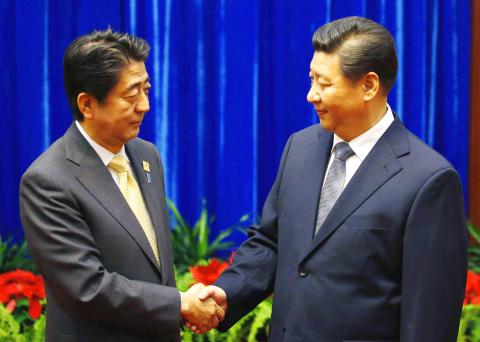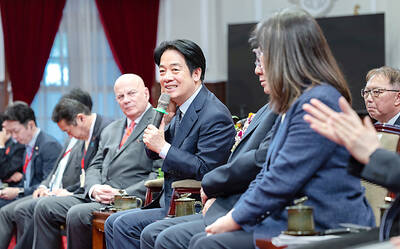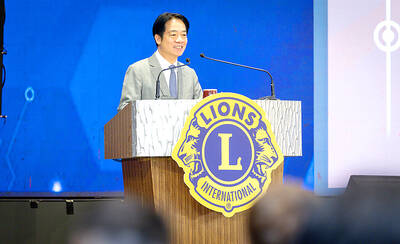Japanese Prime Minister Shinzo Abe’s long-sought meeting with Chinese President Xi Jinping (習近平) was to herald a fresh start to soured relations, but their body language told a different story.
The two looked uncomfortable as they shook hands at the Great Hall of the People in Beijing before heading into a 25-minute discussion. The leaders of Asia’s two biggest economies weighed each other up with stern faces, barely making eye contact after a two-and-a-half-year hiatus in formal top-level meetings caused by disputes over territory and Japan’s wartime past.
While Abe later told reporters that the two had talked of greater cooperation and said it was the first step toward improving ties, China’s Xinhua news agency said that Xi had granted the meeting at Japan’s request.

Photo: AFP
The frigid atmosphere captured in photographs in China’s state-owned media was in stark contrast to those depicting a smiling reunion between Xi and South Korean President Park Geun-hye.
“The pictures and stories in official media are well-chosen,” said Qiao Mu (喬木), an international communications professor at Beijing Foreign Studies University. “The authorities did that to appeal to domestic nationalist sentiment and to tell the public that their president is tough enough on Japan.”
During the meeting, Abe praised Xi’s leadership of the Chinese economy and told him that Japan saw China’s peaceful rise as an opportunity, Japanese Deputy Chief Cabinet Secretary Katsunobu Kato told reporters in Beijing.
Xi urged Japan to do more to enhance mutual trust and play a constructive role in safeguarding the region’s peace and stability, Xinhua reported.
Xi’s expression softened when Abe told him about attending a performance of Chinese ballet in Tokyo last month, Kato said. Xinhua did not report the remark and gave greater prominence on its Web site to a picture of Xi meeting the leader of Papua New Guinea — with its population of 7.3 million.
“I saw the images,” Japanese Chief Cabinet Secretary Yoshihide Suga said in Tokyo after the greeting was broadcast. “What should they have done? What is important is that they have overcome various problems and brought about a leaders’ meeting.”
The talks are a nod toward pragmatism, even if it did look like a reluctant reconciliation, said Jeff Kingston, director of Asian Studies at Temple University in Tokyo.
“I think that their lemony look signals that there are tough challenges ahead in trying to renormalize relations,” he said. “[However,] it seems they have both come to the conclusion that bilateral relations are too important to hold hostage to a lesser issue.”

Two US House of Representatives committees yesterday condemned China’s attempt to orchestrate a crash involving Vice President Hsiao Bi-khim’s (蕭美琴) car when she visited the Czech Republic last year as vice president-elect. Czech local media in March last year reported that a Chinese diplomat had run a red light while following Hsiao’s car from the airport, and Czech intelligence last week told local media that Chinese diplomats and agents had also planned to stage a demonstrative car collision. Hsiao on Saturday shared a Reuters news report on the incident through her account on social media platform X and wrote: “I

‘BUILDING PARTNERSHIPS’: The US military’s aim is to continue to make any potential Chinese invasion more difficult than it already is, US General Ronald Clark said The likelihood of China invading Taiwan without contest is “very, very small” because the Taiwan Strait is under constant surveillance by multiple countries, a US general has said. General Ronald Clark, commanding officer of US Army Pacific (USARPAC), the US Army’s largest service component command, made the remarks during a dialogue hosted on Friday by Washington-based think tank the Center for Strategic and International Studies. Asked by the event host what the Chinese military has learned from its US counterpart over the years, Clark said that the first lesson is that the skill and will of US service members are “unmatched.” The second

STANDING TOGETHER: Amid China’s increasingly aggressive activities, nations must join forces in detecting and dealing with incursions, a Taiwanese official said Two senior Philippine officials and one former official yesterday attended the Taiwan International Ocean Forum in Taipei, the first high-level visit since the Philippines in April lifted a ban on such travel to Taiwan. The Ocean Affairs Council hosted the two-day event at the National Taiwan University Hospital International Convention Center. Philippine Navy spokesman Rear Admiral Roy Vincent Trinidad, Coast Guard spokesman Grand Commodore Jay Tarriela and former Philippine Presidential Communications Office assistant secretary Michel del Rosario participated in the forum. More than 100 officials, experts and entrepreneurs from 15 nations participated in the forum, which included discussions on countering China’s hybrid warfare

MORE DEMOCRACY: The only solution to Taiwan’s current democratic issues involves more democracy, including Constitutional Court rulings and citizens exercising their civil rights , Lai said The People’s Republic of China (PRC) is not the “motherland” of the Republic of China (ROC) and has never owned Taiwan, President William Lai (賴清德) said yesterday. The speech was the third in a series of 10 that Lai is scheduled to deliver across Taiwan. Taiwan is facing external threats from China, Lai said at a Lions Clubs International banquet in Hsinchu. For example, on June 21 the army detected 12 Chinese aircraft, eight of which entered Taiwanese waters, as well as six Chinese warships that remained in the waters around Taiwan, he said. Beyond military and political intimidation, Taiwan